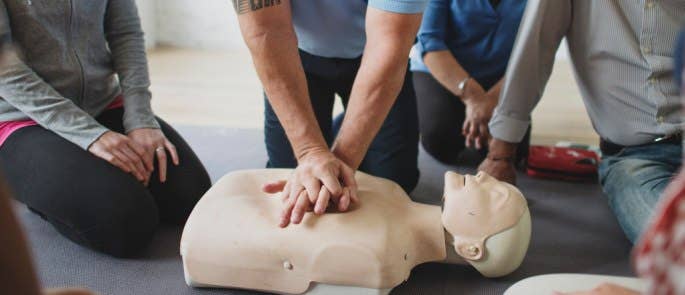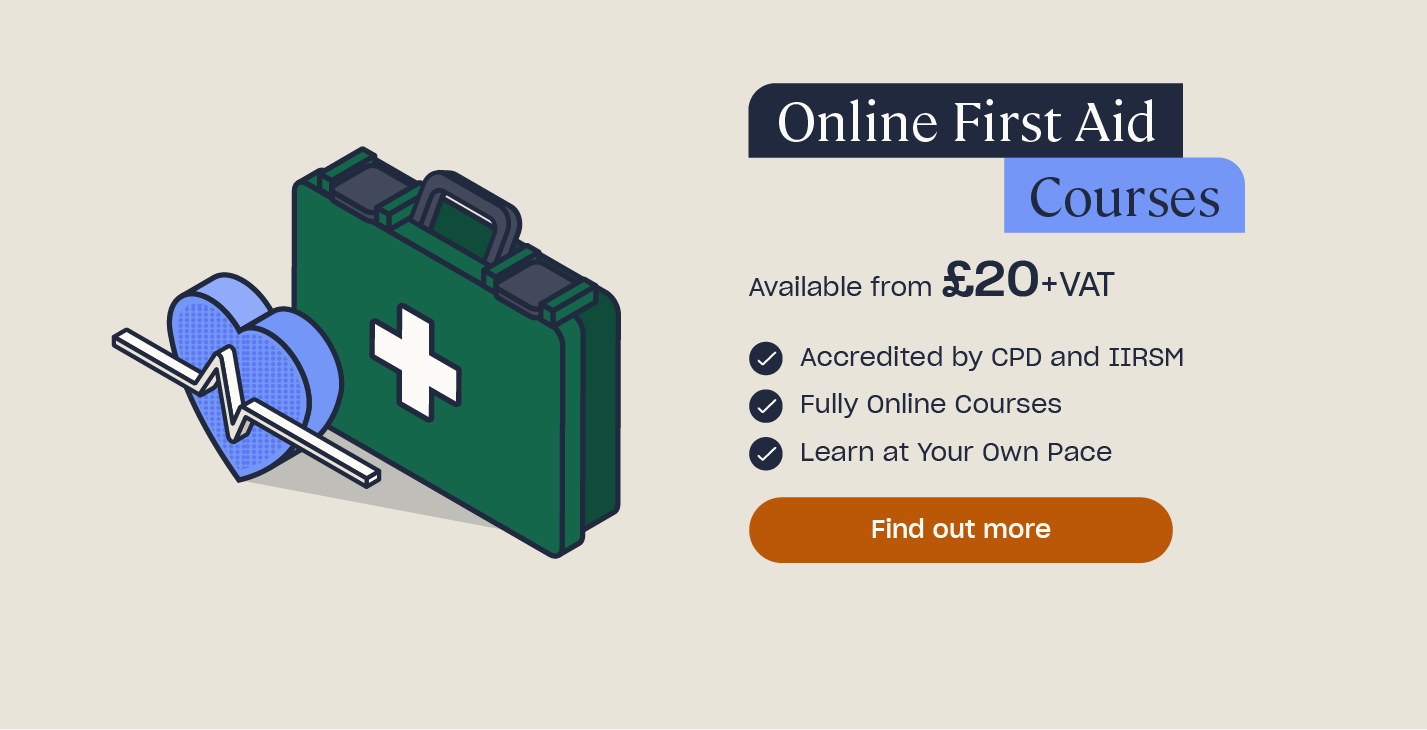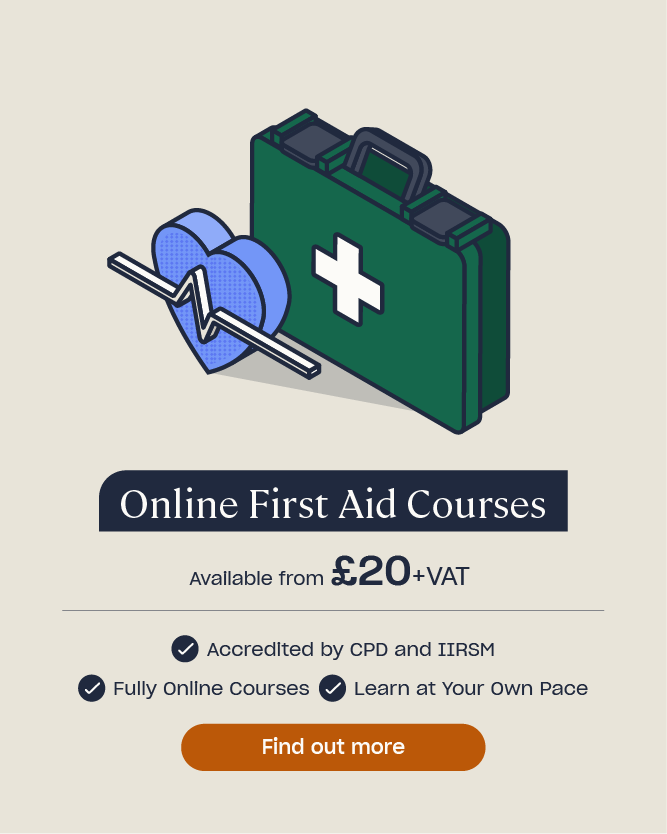How to Support Individuals After Giving First Aid Assistance
Events that require first aid assistance can occur at any time, in any place and can happen to anyone. These events can often be medical emergencies and present a very real threat to life. Whether it be severe bleeding, choking or cardiac arrest, there are many events that are time critical and having even a basic awareness of how to act in such circumstances can mean the difference between life and death.
This article will provide further insights into the importance of first aid assistance, including cardiopulmonary resuscitation (CPR), and look at the ways in which support can be offered following an event that required CPR to be performed. We will also look at how psychological shock can be treated following an accident as well as how prolonged emotional challenges can be recognised following traumatic events.
Looking to learn more?
Our Basic Life Support Training is designed to give you the knowledge and understanding required to react quickly and appropriately in emergency situations, increasing the safety and quality of care provided.
Importance of CPR and First Aid Assistance
We have mentioned that both accidents and health-related emergencies can occur at any time and place and that we are all susceptible to being involved in such events. This makes it likely that those who are present when an emergency occurs will be everyday civilians, without professional medical knowledge or prior experience of dealing with whatever incident it is that lay before them. It may be a stranger, a loved one or a colleague that you are required to help.
Understanding how to respond to an emergency is knowledge that everyone should have and something that each of us may need to put into practice at some time in our lives. Even a basic understanding can help you react more appropriately and crucially, quicker. Knowing the steps to take can help manage everyone’s safety and ensure the casualty gets the help they need in the most appropriate and timely way possible.
It is important to note that you do not require training or a qualification to perform hands-only CPR (chest compressions only), or to use a defibrillator, and do bear in mind that the emergency services operator can offer guidance if you are unsure of how to act or you lack confidence.
CPR plus defibrillation can dramatically increase someone’s chances of survival, making the need to react quickly even more important. Whilst not essential, taking CPR training can improve the competence and confidence with which CPR is performed. Having a first aid qualification is one way to ensure you have the knowledge and skill required to deal with a variety of situations.

Some of the other benefits of gaining a first aid qualification are:
- Improved workplace safety.
- Accidents may be reduced.
- It may help save a life.
- Increased awareness of hazards.
- Better understanding of risks and dangers.
- It helps you to keep calm under pressure.
- It ensures first aid kits are used properly.
The meaning of first aid is exactly as its name suggests – it is the first help that an individual receives when they are ill or injured. The first aider has a responsibility to provide this help whilst keeping the individual, themselves and those around them safe and free from harm. A more detailed look at the duties and responsibilities of a first aider are described further in our Workplace First Aid Course.
Many people seek to gain a first aid qualification and this can be for a variety of reasons. It may be motivated by general interest, a requirement of their working role, they participate in activities with an increased risk of injury, they wish to better protect their family or friends, or because they want to feel better prepared to deal with unexpected injury or illness should they occur.
With this in mind, there is still a large number of people who do not know how to perform CPR, with the Resuscitation Council UK stating over a third of adults in the UK have never taken any form of training to learn CPR skills. Thankfully, the British Heart Foundation amongst others have played an important role in campaigning for children to be taught CPR skills at school and to have this valuable training included as part of the curriculum.
Out of Hospital Cardiac Arrest Guidelines
When a person’s heart loses its ability to function, it ceases to pump and blood no longer flows around the body, the breathing stops and a lack of consciousness occurs. When this takes place outside of a hospital it is known as an out-of-hospital cardiac arrest (OHCA). The British Heart Foundation states there are over 30 thousand OHCAs in the UK each year.

Out-of-hospital cardiac arrests are most often treated by bystanders in the first instance. Unfortunately, out of those 30 thousand who suffer an OHCA each year, only 1 in 10 survive. The time it takes to start CPR has the greatest impact on survival. The need for empowering bystander CPR through awareness and training, and increasing public access to defibrillators, is of vital importance if there is to be any improvement to the rate of survival for these casualties going forward.
There are certain adaptations to remember when it comes to performing CPR. When performing CPR on an adult, an infant (under 12 months) or a child (over 12 months), the way in which compressions and rescue breaths are given varies. Our How to Administer CPR article offers step by step guidance on how to perform CPR and includes useful downloadable infographics for you to display and refer back to at any point.
Supporting Those Suffering With PTSD After Giving CPR
CPR can be a traumatic experience for all involved. The circumstances in which you have to perform CPR can vary, for example, a stranger may collapse in the street with only you around to help, you may have to perform CPR on a loved one, or on a child, or you may have to witness CPR taking place. Regardless of the circumstances or the outcome, the event will likely have an impact on you and your emotions.
Even those with countless experiences and years of training, such as paramedics, nurses and doctors, can still suffer emotional challenges and reactions to this event. Whether you have gone through this experience yourself or are needing to offer support to someone who has, it is important to bear in mind that the impact can last some time and everyone will react and cope in different ways.
Post-traumatic stress disorder (PTSD) is a type of anxiety disorder that is caused by distressing, stressful or frightening events. Each of these words could easily be associated with a situation involving CPR. It is useful to familiarise yourself with PTSD symptoms so you are able to recognise when yourself or someone you know may be being affected by it. Symptoms can often be prolonged and can affect a person’s daily life.
Common PTSD symptoms include:
- Nightmares and flashbacks of the event.
- Feelings of isolation.
- A tendency to withdraw.
- Irritability.
- Feelings of guilt.
- Difficulty concentrating.
- Sleep problems, such as insomnia.

It is incredibly important to access the right support following a traumatic event, whether that means talking to family, friends or colleagues, or seeking counselling to talk through what happened and how you are feeling. There are also online forums and support groups that can be useful as they enable people in similar circumstances to share their experiences and feelings with each other. There are also numerous charities and organisations dedicated to helping people with their mental health, such as Mind, SANE or Anxiety UK.
Furthermore, a GP may be able to offer additional support to help someone manage their symptoms of PTSD, such as anxiety or sleep issues. Do keep in mind that those that need support may initially refuse it, the tendency to withdraw or feelings of guilt can often be responsible for a lack of engagement. Be patient and keep checking in with them, just knowing someone is there and cares can make a big difference to those struggling.
How to Treat Shock After an Accident
Here we refer to the emotional or psychological shock that can take place after an unexpected stressful event. It is often described as a surge of strong emotions that can lead to a physical reaction. These physical reactions are caused by our bodies’ fight or flight response and lead to a range of symptoms, as detailed below. There are many life events that can lead to shock, but the unexpected, sudden and often chaotic nature of an accident is a common cause.
Examples of serious accidents likely to lead to shock include, a car accident, a fall or a near drowning event. These accidents could also cause a need for CPR to be performed on scene or emergency first aid to be delivered, such as managing heavy bleeding.
Again, whether you were directly involved in an accident, needed to perform CPR, or were a witness, it can still be a highly emotive situation. It is important to be able to recognise the symptoms of psychological stress so that appropriate help can be given.
Common psychological stress symptoms include:
- A surge of adrenaline.
- Shaking or feeling jittery.
- Feelings of needing to vomit.
- A tight feeling in the chest.
- Brain fog or difficulty concentrating.
- Intense anger or the desire to lash out or scream.
- The urge to run away.
- Feeling disconnected, like watching events play out as though in a movie or a dream.
- Feeling numb.

There is no right or wrong way to feel after suffering a traumatic event, whether it was performing CPR, providing other emergency aid, being involved in an accident or witnessing these events as they happen. We all have our own coping mechanisms and ways of processing and dealing with our emotions, but being able to recognise the symptoms associated with psychological shock, PTSD or any other emotional challenges, helps us to better understand when someone requires support.
Some ways to support someone suffering psychological shock include:
- Keeping them and those around them safe as they may act impulsively during their initial adrenaline surge.
- Helping them to calm their breathing.
- Not asking them to make any important decisions during the initial stages of shock.
- Reminding them that how they are feeling at that moment will pass.
- Helping them access pain relief as once the initial shock has worn off they may need it. Feelings of tension throughout the body and muscular pain can be common after shock.
- Explaining to them that surges of adrenaline can mask pain, whether caused during the accident or delayed arm soreness after giving CPR.
Coping strategies following psychological shock are the same as with PTSD, these both relate to dealing with ongoing feelings, both emotionally and physically following a traumatic event. Giving yourself and others time to process and heal, whilst making various types of support accessible to all, is incredibly important.
Remember the benefits of talking following a traumatic event, access support systems like counselling, your GP, friends or support groups to help encourage open communication and prevent feelings of isolation. Acts of self-care like regular exercise, eating a healthy diet, keeping a routine and practising relaxation techniques can all help during the process as well.
When an accident takes place or a cardiac arrest occurs, those who witness it or respond by providing emergency aid, can be left with many challenging emotions to deal with. First aid and CPR training can help with competence and confidence, but support should always be offered to all involved following any such traumatic event.
Further Resources:
- Workplace First Aid Training Course
- How to Carry Out the Primary Survey Using the DRABC Steps
- Guidance on What To Do If Someone Is Choking
- Stress Awareness in the Workplace Training Course







